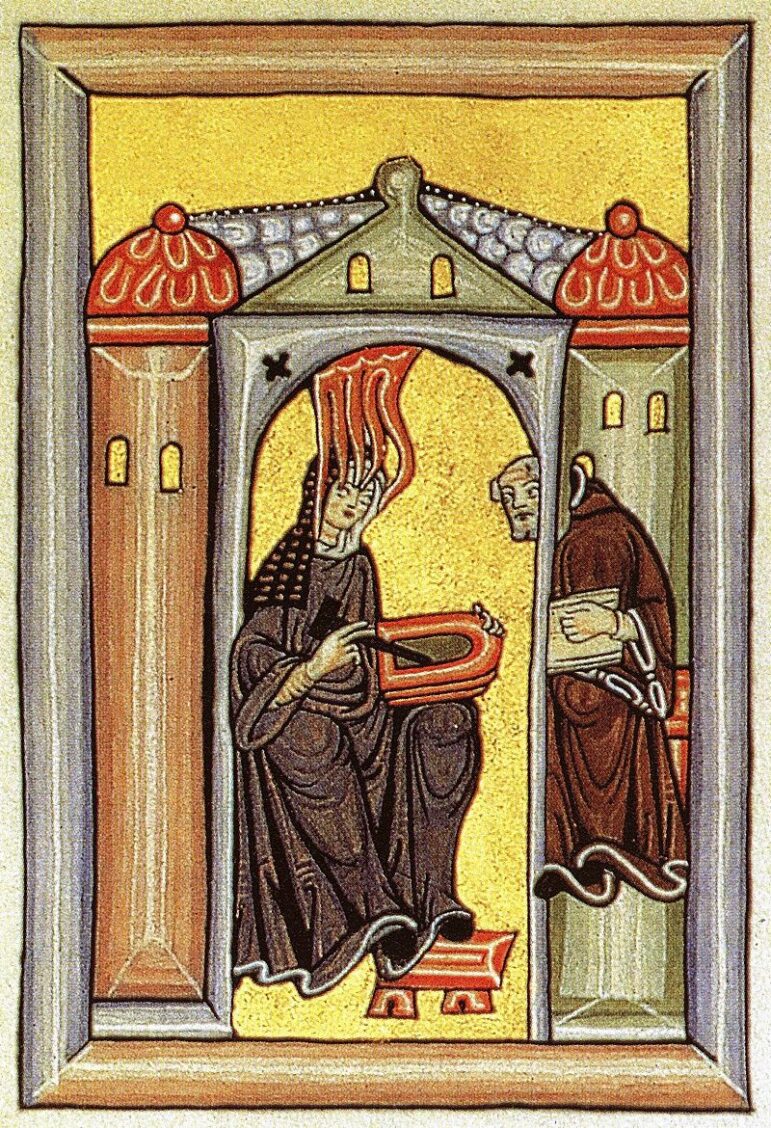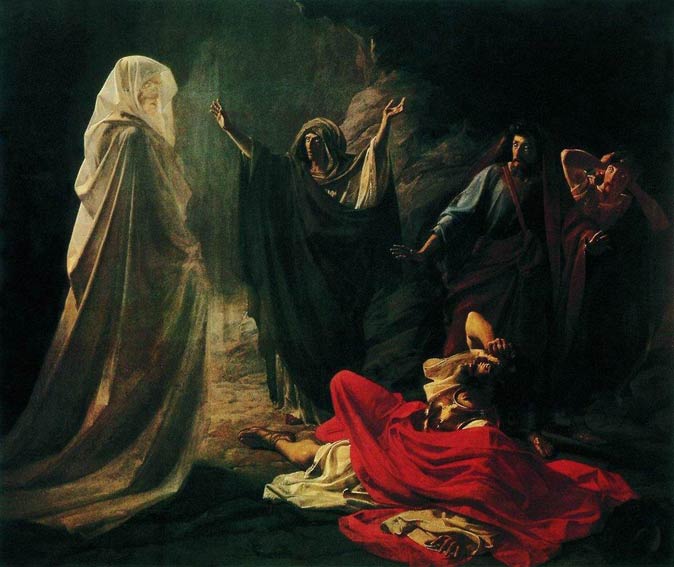
TAMPA, Florida – “Most of us get it from both sides,” says Anamaria, who lives in Central Florida with her dog and sister. “I know Pagans get persecuted about their beliefs, but for all the acceptance of polytheism, it ends if I say I am Christian and a Pagan.”
As Christian Holy Week comes to a close with Easter, the faithful gather to celebrate the resurrection of Jesus Christ. Among those faithful will be some Witches, Druids, and polytheists who maintain their Christian faith while practicing their Pagan tradition. We were curious about how practitioners blended Christian and modern Pagan practices but the reception we got to requests for interviews was cautious at best.
The Wild Hunt spoke with Anamaria, who describes herself as a Christian Hedge Witch, and Lily, an eclectic practitioner of Witchcraft who maintains her Christian faith.
“I can be both,” says Lily. (Both Lily and Anamaria asked that we only use their first names in this story.)
Lily says that these are the ways she was taught by her family. “I keep the Sabbaths; I follow the Wheel of the Year. But my Christian faith is dear to me. I go to church, and I believe Jesus is my savior.”
She lives near Morgantown, West Virginia part of the year and says it is not safe to be open about her practices, especially outside the city.
When asked about church, Anamaria says, “I don’t go every Sunday. I mean I have a life!” But she added, “I was raised Catholic, so I do go on the Holy Days of Obligation. I made that commitment during my confirmation.”

Hildegard von Bingen receives a divine inspiration and passes it on to her scribe. [Public Domain]
Anamaria added that she honors the tradition of Hildegard of Bingen, a 12th-century Benedictine Abbess, mystic, and Doctor of the Catholic Church, who was beatified in 2012 by Pope Benedict XVI. Hildegard is also venerated in Lutheranism and in the Anglican Communion.
Hildegard of Bingen wrote extensively not only about theology but also cataloged the medicinal properties of animals, plants, and stones while developing medical practices to address diseases, bleeding, fractures, burns, and cuts. She was a pioneer in holistic medicine and even developed a secret alphabet, the Lingua Ignota, to keep her writings private.
“I think St. Hildegard was a Witch,” said Anamaria, “by any modern or ancient standard. She was a healer and feminist who honored God. You can love Christ and the Craft at the same time.”
When asked, Lily said her Witchcraft is not rooted in a faith tradition; rather it is a family tradition. “We cast prayers. We use herbs and tools. We work energy: the knowledge comes from us, but the power comes to us from God.
“When a baby has hiccups,” she mentions as an example, “I take some red string and put it on the baby’s forehead with some spit. I pray for Jesus to give me the power of the hiccups and they leave the child.”
Christian Witches receive harassment from the mainstream Christian community as well. They are often targeted as demonic and confused, and subjected to barrages of Bible verses – most often the infamous verses from Exodus 22:18, “Thou shalt not suffer a witch to live,” and Ephesians 5:11, “Take no part in the unfruitful works of darkness, but instead expose them.”
“I’ve heard them all,“ said Lily, “I’ve been prayed for, prayed over, and prayed at.”
“And don’t forget the Lake of Fire!” Lily added, laughing, referring to the Book of Revelation 21:8, which reads, “But the cowardly, the unbelieving, the vile, the murderers, the sexually immoral, those who practice magic arts, the idolaters and all liars—they will be consigned to the fiery lake of burning sulfur. This is the second death.”
Pagans say the same things, just without the hellfire, they both said. “When I go to an event like Pagan Pride and say that I am a Christian Witch, I get confused stares and am constantly asked, ‘Why are you here?’” Anamaria said. “People think I am confused.”
Unfortunately, they both said that confusion often turns into attacks. Anamaria added that she is in private social media groups for Christian Witches because the verbal attacks are real. “We are supposed to choose sides,” she said. “We’re not supposed to read books about Witchcraft, read Patheos, or The Wild Hunt. We’re supposed to be good girls and submit to the Christian worldview and its authorities.”
“I’m pretty sure Jesus didn’t like the ‘authorities,’” added Lily. “But Witches like to point out that Witchcraft can be a religion or a practice or a way of life. That seems to apply only if you are not a Christian.”
“You can be Jewish and a Witch. You can be a Buddhist and a Witch. No one cares. But say you are Christian and a Witch and you are out.”
Both Lily and Anamaria were also cautious about referencing Wicca and making sure there were boundaries in the conversation. “I don’t think I am the best person to speak about this,” said Anamaria, “but I practice Witchcraft – I am not in the Wiccan religion.”
When pushed about obvious inconsistencies between Christianity and both Paganism generally and Witchcraft specifically, Anamaria believes that people misread the Bible. She suggested that a nature practice is parallel to Christianity, but that Satanic Witchcraft would not be. “It is Satanic Witchcraft that the Bible discusses. That’s what I believe. I know am still accused of cherry-picking verses, but that is what I believe.”
Lily added that there are online communities for Christian Witches, but that most are secret groups to promote safety. She mentioned the Reverend Valerie Love (otherwise known as KAISI, (a name she received from Mother Ayahuasca in a ceremony in Peru), a practicing Christian Witch and founder of the Covenant of Christian Witches Mystery School in the Solomonic Tradition. In a video “rant,” Love says: “Stop telling people how to worship. Stop telling people how to contact the Divine. I can’t tell you how many people have told me I can’t be a Christian Witch, but here I am.”
“As a practicing Christian Witch,” Love told us, “I’m thankful for a spiritual path that integrates the most soul-moving aspects of Christ and my decades-long relationship with this Ascended Master and the heart of being a Witch. A big part of what I do as a teacher is education and awareness of the truth: Christ and the Witch are not alien to one another, nor are they inherently antithetical.”
She added that she came out of the “broom closet” in 2011, but experienced immediate backlash, which she affirms others still endure.
“Though many in my personal life knew about my path, when I came out the broom closet on YouTube in October of 2011 about being a Christian Witch, the backlash was swift and intense from both Christians and Witches. The former held me as a blasphemer and heretic while the latter was appalled at what seemed like betrayal of my kind to the very ones who burned us.
For me, neither one of these stances is true for me. As sovereign beings, we each get to choose the path most satisfying to the heart, soul and spirit. My choice of being a Christian Witch has made me stronger and hopefully has helped others.”
As for the growth of the movement and its size, it is not entirely clear. Several books on Christian Witchcraft have been released over the past three decades, but it has seemingly gained traction over the last ten years. There are also several private groups for Christian Witches, including practices for those of different denominations such as Catholic Witches. Some Facebook groups have several thousand individuals in them.

The Witch of Endor by Nikolai Ge. [Public Domain]
Their practices vary yet remain centrally Christian. Most describe the spiritual powers harnessed by Witches as gifts of the Holy Spirit. Some Witches note the success of the Witch of Endor, who summoned the spirit of the prophet Samuel for Saul and prophesied events but was never “punished” by God.
Other Christian Witch groups characterize their practice in a manner similar to the Red Letter Christian movement, a non-denominational movement in Christianity that solely focuses on the words attributed to Jesus, often printed in red letters in New Testament Bibles. That tradition focuses more on poverty, family, and social justice.
“I follow what Jesus said, not what others wrote about Jesus,” Anamaria says.
Love emphasized that “ultimately, Christian Witches, the global community, are about freedom of worship and freedom of devotion for all people. That is the world I desire to see, so that is the world in which I actively pour my love, intention and magick.”
Love says that she will continue to build her community online, on Facebook, and on YouTube. “The Christian Witches Convention 2023 will be held in Las Vegas, Nevada, USA on Memorial Day weekend,” she added. “All who desire to learn and commune with others on this path are welcome.”
As for the Hell problem, Lily commented that she is not an Evangelical. “That’s Evangelical hell. I don’t believe it exists.”
Anamaria agreed. She paraphrased Pope Francis by saying, “God is love and I am not in the business of judging others.
“I don’t think God condemns good people to Hell,” she concluded, “and that includes Witches.”
The Wild Hunt is not responsible for links to external content.
To join a conversation on this post:
Visit our The Wild Hunt subreddit! Point your favorite browser to https://www.reddit.com/r/The_Wild_Hunt_News/, then click “JOIN”. Make sure to click the bell, too, to be notified of new articles posted to our subreddit.